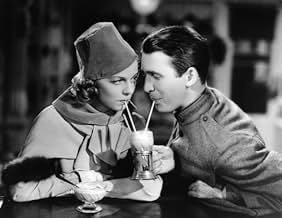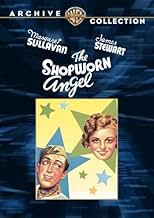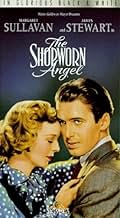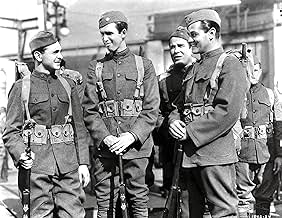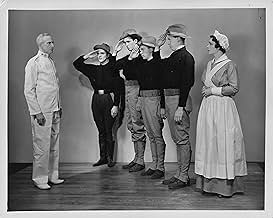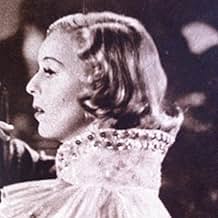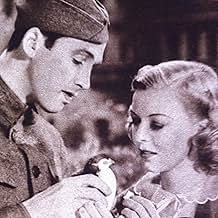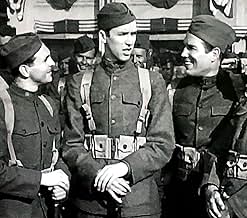NOTE IMDb
6,9/10
1,7 k
MA NOTE
Ajouter une intrigue dans votre langueShortly after the United States enters World War I in 1917, a Broadway actress agrees to let a naive soldier court her in order to impress his friends, but a real romance soon begins.Shortly after the United States enters World War I in 1917, a Broadway actress agrees to let a naive soldier court her in order to impress his friends, but a real romance soon begins.Shortly after the United States enters World War I in 1917, a Broadway actress agrees to let a naive soldier court her in order to impress his friends, but a real romance soon begins.
- Réalisation
- Scénario
- Casting principal
- Récompenses
- 3 victoires au total
Charley Grapewin
- Wilson - Caretaker
- (scènes coupées)
Wade Boteler
- Irish Policeman
- (non crédité)
Don Brodie
- Candy Store Attendant
- (non crédité)
Jimmy Butler
- Jack - Elevator Boy
- (non crédité)
Eddy Chandler
- Corporal
- (non crédité)
George Chandler
- Tommy - Soldier
- (non crédité)
Roger Converse
- Hotel Clerk
- (non crédité)
James Flavin
- Guard Yelling 'Halt!'
- (non crédité)
Avis à la une
While the Stewart-Sullivan pairing doesn't quite live up to the chemistry they have in The Shop Around the Corner, this earlier film shows they had it even then. It's their acting talent that keeps this film from being a major letdown. Walter Pidgeon is also good in his role, for what it is. It's the plot that stinks. The two leads have SO much chemistry that it makes Sullavan's character Daisy Heath's relationship with Pidgeon's Sam Bailey not so realistic. She was supposed to have realized she was still more in love with Sam than ever but it just doesn't quite come across. What does leap off the screen is the chemistry between Bill Pettigrew (played by Stewart) and Daisy Heath..so yes, it's a letdown that Heath is not supposed to be in love with Bill when the plot builds up to it.
Beautifully wrought picture with exquisite performances from the two leads. Margaret Sullavan was truly one of the most effective actresses of the golden age, able to wring the most genuine emotions out of any situation. The brevity of her filmography is really a shame. Much more comfortable on stage than film she was reportedly difficult to work with because of her discomfort with the medium but even with that delivered the goods once the camera started to turn. She and Jimmy made a great team since her slightly bruised fragility always blended so well with his gentle naiveté. The story is just a boy meets girl tale with a few twists but because of the stars as well as Walter Pidgeon, complicating matters but also being wise and warm, and the always amazing Hattie McDaniel, being her usual flip self it remains involving throughout. The ending is heartbreaking in its simplicity.
The Waldo Salt screenplay takes a small story and develops it into an affecting portrait of three surprisingly convincing and complex human characters, all of whom transcend the typical dramatic constraints of late '30s Hollywood. All three principals turn in excellent, low-key performances in perfect keeping with the film's narrative strengths. I find it particularly interesting to compare this with the other bookend to Salt's screenwriting career, Coming Home, also a character-driven story that revolves around the complex, three-way relationship between a woman and the two men who love her in a time of war.
There's no doubt that THE SHOPWORN ANGEL uses a plot that has been used countless times in movies and books over the years. It's the story of a selfish actress (MARGARET SULLAVAN) suddenly succumbing to the country boy charm of a soldier (JAMES STEWART) who is about to be sent overseas in WWII. Meanwhile, she has her agent WALTER PIDGEON, whom she depends upon for emotional support and love. Surely, there is nothing new about the bare outline of the plot.
But what works in the story's favor is the simplicity and charm of the three leads. Sullavan is more radiant than usual as a glamorous actress rather than the drab little wren she usually played and she plays her part in a refreshing manner that is almost able to overcome the idea that she should suddenly turn so noble. Despite this flaw in the characterization, it's a very winning performance that she gives.
Likewise, JAMES STEWART does wonders with a thinly devised role of the country bumpkin who falls impetuously in love with an actress, even to the point of asking her to marry him before he goes overseas. At this point, the plot's outcome becomes telegraphed because we know this is a Margaret Sullavan film and tearful romantic dramas have been her specialty. Thus, the ending becomes a forgone conclusion.
WALTER PIDGEON is her kindly suitor who has the wisdom to make the best of a situation he's not exactly comfortable with. He anchors the story with his sensitive performance as the man who can always be depended on to give the heroine the emotional support she needs. He's also got an abundant sense of humor that the story needs.
It's a trifle of a film, but beautifully acted and given a lift by the winsome performances of its three leads, moving at a brisk pace to the Hollywood ending. HATTIE McDANIEL is her usual delightful self as Miss Sullvan's down-to-earth maid.
But what works in the story's favor is the simplicity and charm of the three leads. Sullavan is more radiant than usual as a glamorous actress rather than the drab little wren she usually played and she plays her part in a refreshing manner that is almost able to overcome the idea that she should suddenly turn so noble. Despite this flaw in the characterization, it's a very winning performance that she gives.
Likewise, JAMES STEWART does wonders with a thinly devised role of the country bumpkin who falls impetuously in love with an actress, even to the point of asking her to marry him before he goes overseas. At this point, the plot's outcome becomes telegraphed because we know this is a Margaret Sullavan film and tearful romantic dramas have been her specialty. Thus, the ending becomes a forgone conclusion.
WALTER PIDGEON is her kindly suitor who has the wisdom to make the best of a situation he's not exactly comfortable with. He anchors the story with his sensitive performance as the man who can always be depended on to give the heroine the emotional support she needs. He's also got an abundant sense of humor that the story needs.
It's a trifle of a film, but beautifully acted and given a lift by the winsome performances of its three leads, moving at a brisk pace to the Hollywood ending. HATTIE McDANIEL is her usual delightful self as Miss Sullvan's down-to-earth maid.
Shy young soldier James Stewart is picked on by his fellow soldiers for not being a ladies man. Jaded showgirl Margaret Sullavan agrees to help him out by pretending to be his girlfriend. He quickly falls in love with her for real but things are complicated by his having to ship out for the war and her already having a boyfriend (Walter Pidgeon).
The second of four movies pairing Stewart and Sullavan. Their chemistry is remarkable as always. This one doesn't turn out how you might think and I can easily see many viewers being disappointed. It builds up towards one thing but shifts gears 3/4 of the way through and becomes something else. I still enjoyed it, though.
The second of four movies pairing Stewart and Sullavan. Their chemistry is remarkable as always. This one doesn't turn out how you might think and I can easily see many viewers being disappointed. It builds up towards one thing but shifts gears 3/4 of the way through and becomes something else. I still enjoyed it, though.
Le saviez-vous
- AnecdotesBroadway musical-comedy star Mary Martin provides the singing voice for Margaret Sullavan. This same year she also dubbed the singing voice for Gypsy Rose Lee in Les deux bagarreurs (1938). Modern sources indicate that Universal's La coqueluche de Paris (1938), which was filmed at approximately the same time as The Shopworn Angel was Martin's first film "bit" role. According to records of the M-G-M Music Collection at the USC Cinema-Television Library, Martin's recording of "Pack Up Your Troubles in Your Old Kit Bag and Smile, Smile, Smile was made on 1 June 1938.
- GaffesBill mails his postcards after leaving the soda fountain, seemingly without putting any stamps on them, but on one shot while he's sitting at the lunch counter you can see stamps on the cards. However, in the next close-up, just before he leaves, the cards are unstamped. The likely reason is that all the closeup shots where he's writing on the blank cards were filmed together with the same camera setup, and the long shots were shot later after stamps were added. (Perhaps they filmed a scene of Bill buying and affixing stamps but decided not to use it.)
- Citations
Pvt. William 'Texas' Pettigrew: Dying's a lot like being in love. You can't imagine it until its right on top of you.
- ConnexionsFeatured in AFI Life Achievement Award: A Tribute to James Stewart (1980)
- Bandes originalesYou're In The Army Now
(1917) (uncredited)
Music by Isham Jones
Lyrics by Tell Taylor and Ole Olsen
Played as background music for marching soldiers
Meilleurs choix
Connectez-vous pour évaluer et suivre la liste de favoris afin de recevoir des recommandations personnalisées
- How long is The Shopworn Angel?Alimenté par Alexa
Détails
Box-office
- Budget
- 531 000 $US (estimé)
- Durée1 heure 25 minutes
- Couleur
- Rapport de forme
- 1.37 : 1
Contribuer à cette page
Suggérer une modification ou ajouter du contenu manquant

Lacune principale
By what name was L'ange impur (1938) officially released in India in English?
Répondre

